七年级上册英语Unit3_Topic1_do和does引导的一般疑问句
- 格式:doc
- 大小:29.11 KB
- 文档页数:3
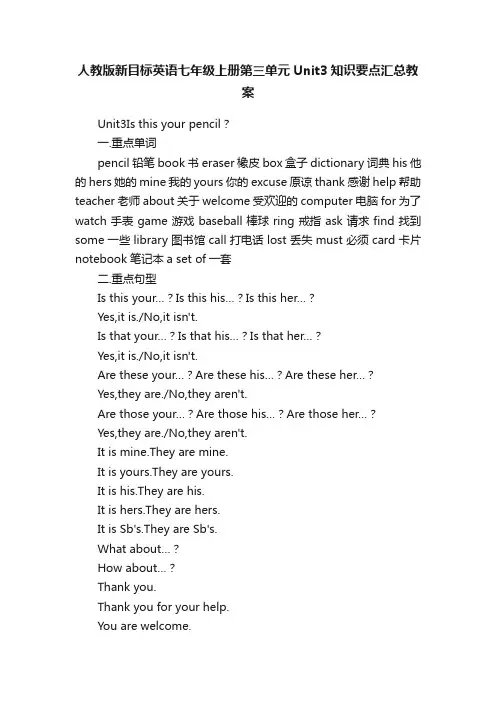
人教版新目标英语七年级上册第三单元Unit3知识要点汇总教案Unit3Is this your pencil?一.重点单词pencil铅笔book书eraser橡皮box盒子dictionary词典his他的hers她的mine我的yours你的excuse原谅thank感谢help帮助teacher老师about关于welcome受欢迎的computer电脑for为了watch手表game游戏baseball棒球ring戒指ask请求find找到some一些library图书馆call打电话lost丢失must必须card卡片notebook笔记本a set of一套二.重点句型Is this your…?Is this his…?Is this her…?Yes,it is./No,it isn't.Is that your…?Is that his…?Is that her…?Yes,it is./No,it isn't.Are these y our…?Are these his…?Are these her…?Yes,they are./No,they aren't.Are those your…?Are those his…?Are those her…?Yes,they are./No,they aren't.It is mine.They are mine.It is yours.They are yours.It is his.They are his.It is hers.They are hers.It is Sb's.They are Sb's.What about…?How about…?Thank you.Thank you for your help.You are welcome.例句Examples-Is this your pencil?-Yes,it is.-Are those Bob's books?-No,they aren't.They are Sally's.-Thank you.-You are welcome.-Is that her watch?-No,it isn't.It is John's.-What about the blue cup?-It's mine.The green cup is hers.-Thank you for your help.-You are welcome.三.语法要点1.一般疑问句General Questions助动词/BE动词/情态动词+主语+其他(实意谓语、表语等)助动词:do does did have has hadBE动词:am is are was were情态动词:can could may shall should will would一般疑问句通常用Yes或No来回答,后跟相应的简短主谓略写。
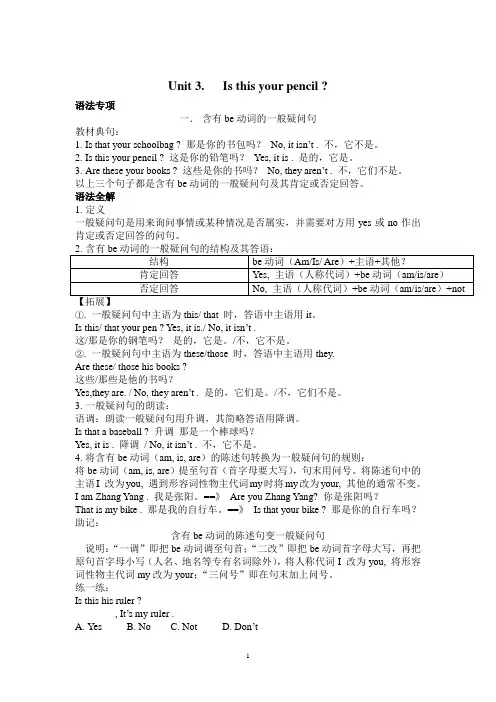
Unit 3. Is this your pencil ?语法专项一.含有be动词的一般疑问句教材典句:1.Is that your schoolbag ? 那是你的书包吗?No, it isn’t . 不,它不是。
2.Is this your pencil ? 这是你的铅笔吗?Yes, it is . 是的,它是。
3.Are these your books ? 这些是你的书吗?No, they aren’t . 不,它们不是。
以上三个句子都是含有be动词的一般疑问句及其肯定或否定回答。
语法全解1.定义一般疑问句是用来询问事情或某种情况是否属实,并需要对方用yes或no作出肯定或否定回答的问句。
2.含有be动词的一般疑问句的结构及其答语:结构be动词(Am/Is/ Are)+主语+其他?肯定回答Yes, 主语(人称代词)+be动词(am/is/are)否定回答No, 主语(人称代词)+be动词(am/is/are)+not 【拓展】①. 一般疑问句中主语为this/ that 时,答语中主语用it。
Is this/ that your pen ? Yes, it is./ No, it isn’t .这/那是你的钢笔吗?是的,它是。
/不,它不是。
②. 一般疑问句中主语为these/those 时,答语中主语用they.Are these/ those his books ?这些/那些是他的书吗?Yes,they are. / No, they aren’t . 是的,它们是。
/不,它们不是。
3.一般疑问句的朗读:语调:朗读一般疑问句用升调,其简略答语用降调。
Is that a baseball ? 升调那是一个棒球吗?Yes, it is . 降调/ No, it isn’t . 不,它不是。
4.将含有be动词(am, is, are)的陈述句转换为一般疑问句的规则:将be动词(am, is, are)提至句首(首字母要大写),句末用问号。
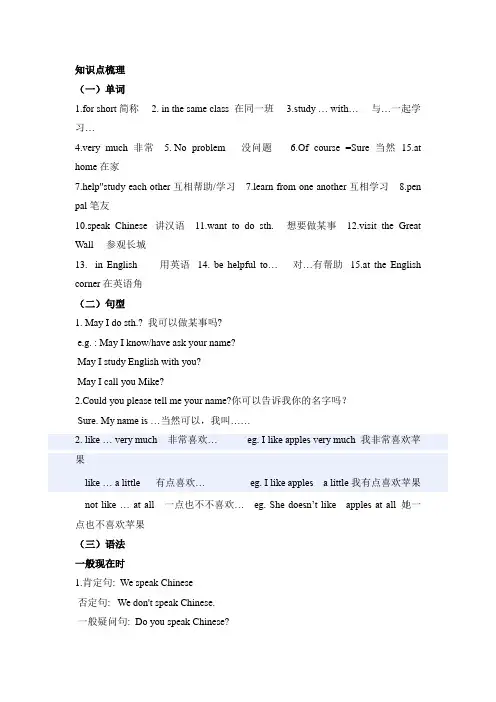
知识点梳理(一)单词1.for short简称2. in the same class 在同一班3.study … with…与…一起学习…4.very much 非常5. No problem 没问题6.Of course =Sure 当然15.at home在家7.help"study each other 互相帮助/学习7.learn from one another互相学习8.pen pal笔友10.speak Chinese 讲汉语11.want to do sth. 想要做某事12.visit the Great Wall 参观长城13. in English 用英语14. be helpful to…对…有帮助15.at the English corner 在英语角(二)句型1. May I do sth.? 我可以做某事吗?e.g. : May I know/have ask your name?May I study English with you?May I call you Mike?2.Could you please tell me your name?你可以告诉我你的名字吗?Sure. My name is …当然可以,我叫……2. like … very much 非常喜欢… eg. I like apples very much 我非常喜欢苹果like … a little 有点喜欢… eg. I like apples a little我有点喜欢苹果not like … at all 一点也不不喜欢… eg. She doesn’t like apples at all 她一点也不喜欢苹果(三)语法一般现在时1.肯定句: We speak Chinese否定句: We don't speak Chinese.一般疑问句: Do you speak Chinese?回答: Yes, we do. No, we don't.2.肯定句: Mike speaks English.否定句: Mike doesn't speak English.一般疑问句: Does Mike speak English?回答: Yes, he does. No, he doesn't.3.动词第三人称单数构成形式:见书本107页代词人称代词: 数/格人称单数复数主格宾格主格宾格第一人称I me we us 第二人称you you you you第三人称hesheit himheritthey them主格:在句中当句子主语e.g. I have a good friend.He has a good friend.宾格: 在句中当动词的宾语或介词的宾语,形成动宾或介宾结构.Please call me Mike. (动宾)Give it (动宾) to me (介宾) .Help us find him. (动宾)人称代词排列顺序:(可记住口诀)you, he and I; we, you and they; he and she口诀:对你尊重you在前,谦虚礼貌I最后;我们人多力量大,we要排在you之前,they委屈垫在后;两性并列不平等,绅士风度放一边,he 在前she在后。
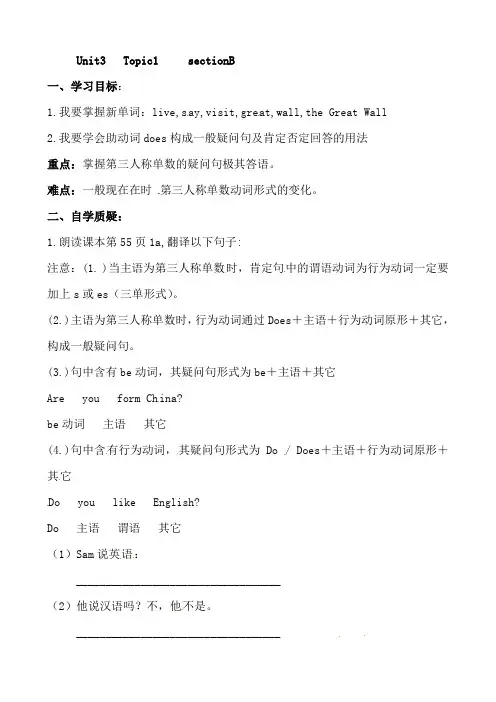
Unit3 Topic1 sectionB一、学习目标:1.我要掌握新单词:live,say,visit,great,wall,the Great Wall2.我要学会助动词does构成一般疑问句及肯定否定回答的用法重点:掌握第三人称单数的疑问句极其答语。
难点:一般现在在时第三人称单数动词形式的变化。
二、自学质疑:1.朗读课本第55页1a,翻译以下句子:注意:(1. )当主语为第三人称单数时,肯定句中的谓语动词为行为动词一定要加上s或es(三单形式)。
(2.)主语为第三人称单数时,行为动词通过Does+主语+行为动词原形+其它,构成一般疑问句。
(3.)句中含有be动词,其疑问句形式为be+主语+其它Are you form China?be动词主语其它(4.)句中含有行为动词,其疑问句形式为Do / Does+主语+行为动词原形+其它Do you like English?Do 主语谓语其它(1)Sam说英语:___________________________________ (2)他说汉语吗?不,他不是。
___________________________________(3)他住在英国吗?是的,他是_______________________________ .(4)他在信里说了什么?______________________________________ (5)他想要参观长城。
_________________________________________2.听1a录音,完成1b表格并核对答案。
3.根据1a内容,完成1d填空并核对答案。
三、合作探究1.小组合作分角色表演1a2.巩固所学内容根据关键词尝试介绍人物。
向你的同伴描述你的笔友。
四、当堂检测:翻译下列词组。
1. 讲英语_________________2 住在英国 __________________3想要去参观 _____________________选用is / are / do / does 填空。
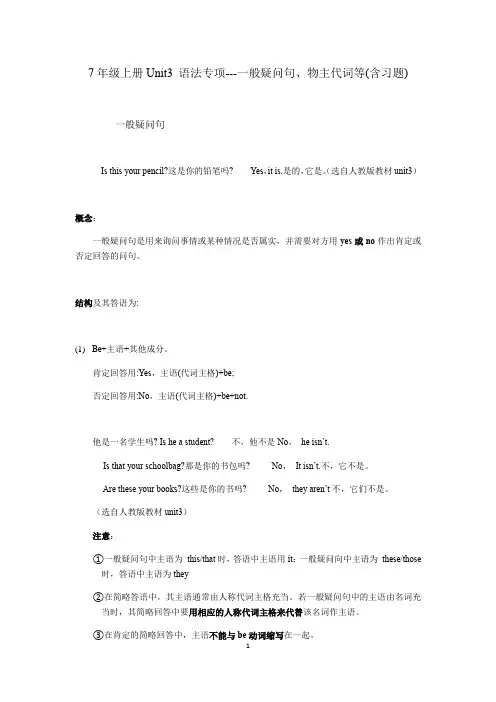
7年级上册Unit3 语法专项---一般疑问句、物主代词等(含习题)一般疑问句---Is this your pencil?这是你的铅笔吗? ---Yes,it is.是的,它是。
(选自人教版教材unit3)概念:一般疑问句是用来询问事情或某种情况是否属实,并需要对方用yes或no作出肯定或否定回答的问句。
结构及其答语为:(1)Be+主语+其他成分。
肯定回答用:Yes,主语(代词主格)+be;否定回答用:No,主语(代词主格)+be+not.他是一名学生吗? Is he a student? 不,他不是No,he isn’t.--- Is that your schoolbag?那是你的书包吗? ---No,It isn’t.不,它不是。
--- Are these your books?这些是你的书吗? ---No,they aren’t不,它们不是。
(选自人教版教材unit3)注意:①一般疑问句中主语为this/that时,答语中主语用it;一般疑问向中主语为these/those时,答语中主语为they②在简略答语中,其主语通常由人称代词主格充当。
若一般疑问句中的主语由名词充当时,其简略回答中要用相应的人称代词主格来代替该名词作主语。
③在肯定的简略回答中,主语不能与be动词缩写在一起。
---Is Li Lei your friend?李雷是你的朋友吗?---Yes,he is.是的,他是。
④在否定的简略回答中,be动词常与not缩写在一起,一般不分开。
---Is she a doctor?她是一名医生吗?No, she isn’t.不,她不是⑤am和not不能缩写--- Are you Lucy?你是露西吗? ---No,I’m not. (不能写成I amn’t)不,我不是⑥两个缩写不能同时使用They are not my rulers. (不能缩写成They’ren’t) 它们不是我的尺子。

人教版英语七年级上册关于助动词do\does的正确运用知识总结与练习进入第五单元后,引入了助动词do以及does,很多学生便无法区分什么时候用助动词,什么时候用be(is\am\are)动词。
接下来,我们就从一般疑问句、否定句、特殊疑问句三个方面来分别讲一讲。
一、一般疑问句。
一般疑问句是用Yes \ No来回答的疑问句,前面的四个单元我们见的比较多,那个时候是用be动词来引导的。
例如:Are you Tom? \ Is she Grace?\ Are they Tom and Jerry?\Is this your ruler? \ Are those his dictionaries? \ Is Alice your aunt? \ Is the pencil in the pencil case? \ Are the books in the bookcase?从第五单元Unit 5 Do you have a soccer ball?开始,引入了助动词引导的一般疑问句,例如:Do you have a basketball? \ Does she have a sports collection? \ Do you like apples? \ Does she like strawberries?be动词引导的一般疑问句和助动词引导的一般疑问句,最本质的差别就是看有没有动词,如果有,就用助动词来引导,如果没有,就用be动词来引导。
练习题:根据句意,用适当的be动词(is\am\are)或者助动词(do\does)填空。
1、_______ the boy your brother?2、_________ they your parents?3、_________ you have a baseball bat?4、_________ Mr. Wang your English teacher?5、_________ Tom and Jenny friends?6、_______ Grace your classmate?7、_________ the boy like his school ?8、_________ the girl play sports every day?9、________ you from China?10、________ your cousin watch TV every day?解题思路:观察所有的句子,找出带有实义动词的,就用助动词Do或者Does,如果没有实义动词的,就用be动词(I 用am ,you用are ; is单数,复数are。
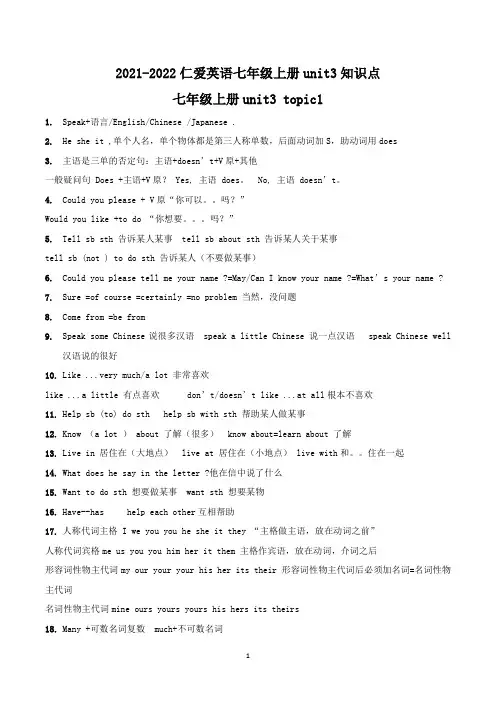
2021-2022仁爱英语七年级上册unit3知识点七年级上册unit3 topic11.Speak+语言/English/Chinese /Japanese .2.He she it ,单个人名,单个物体都是第三人称单数,后面动词加S,助动词用does3.主语是三单的否定句:主语+doesn’t+V原+其他一般疑问句 Does +主语+V原? Yes, 主语 does。
No, 主语 doesn’t。
4.Could you please + V原“你可以。
吗?”Would you like +to do “你想要。
吗?”5.Tell sb sth 告诉某人某事 tell sb about sth 告诉某人关于某事tell sb (not ) to do sth 告诉某人(不要做某事)6.Could you please tell me your name ?=May/Can I know your name ?=What’s your name ?7.Sure =of course =certainly =no problem 当然,没问题e from =be from9.Speak some Chinese说很多汉语 speak a little Chinese 说一点汉语 speak Chinese well汉语说的很好10.Like ...very much/a lot 非常喜欢like ...a little 有点喜欢 don’t/doesn’t like ...at all根本不喜欢11.Help sb (to) do sth help sb with sth 帮助某人做某事12.Know (a lot ) about 了解(很多) know about=learn about 了解13.Live in 居住在(大地点) live at 居住在(小地点) live with和。
住在一起14.What does he say in the letter ?他在信中说了什么15.Want to do sth 想要做某事 want sth 想要某物16.Have--has help each other互相帮助17.人称代词主格 I we you you he she it they “主格做主语,放在动词之前”人称代词宾格me us you you him her it them 主格作宾语,放在动词,介词之后形容词性物主代词my our your your his her its their 形容词性物主代词后必须加名词=名词性物主代词名词性物主代词mine ours yours yours his hers its theirs18.Many +可数名词复数 much+不可数名词some/any+可复数/不可数名词(some用在肯定句或期待得到肯定回答的疑问句中 any用在疑问句或否定句中)a lot of =lots of =plenty of +可复数/不可数19.A lot =very much “非常(句末)”Unit 3Topic 21.问职业:What do/does ...do ?=What’s ...’s /形容词性物主代词 job?=What is/are ...? What’s your father’s job ?=What does your father do ? =What is your father ?What’s his job ?2.Glad to meet you ! =Nice to meet you ! Be glad to do 乐意做某事3.Be home 在家 get home 到家come home回到家go home 回家4.Welcome to ...5.An office worker an actor6.cook 厨师--cooker炉灶 farm农场--farmer农民 teach 教--teacher教师act表演--actor演员 work 工作--worker工人7.In a school on a farm in an office on the sofa8.Show sb sth =show sth to sb向某人展示某物9.give sb sth =give sth to sb 把某物给某人10.Who is the boy in the photo ?照片里的男孩是谁? A photo of my family我的一张全家福11.My grandparents ,my cousin and I I 要放在最后,以示礼貌12.A big family family 指整个家庭谓语用单数指家庭成员时谓语用复数My family is a big family . After supper ,my family often watch TV .13.Sister /brother 姐妹兄弟 cousin表兄弟姐妹14.Like/love to do 偶然的喜欢,想做某事 like/love doing 表示爱好15.Play with 和。
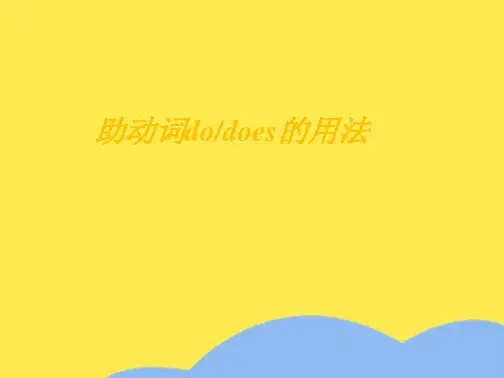
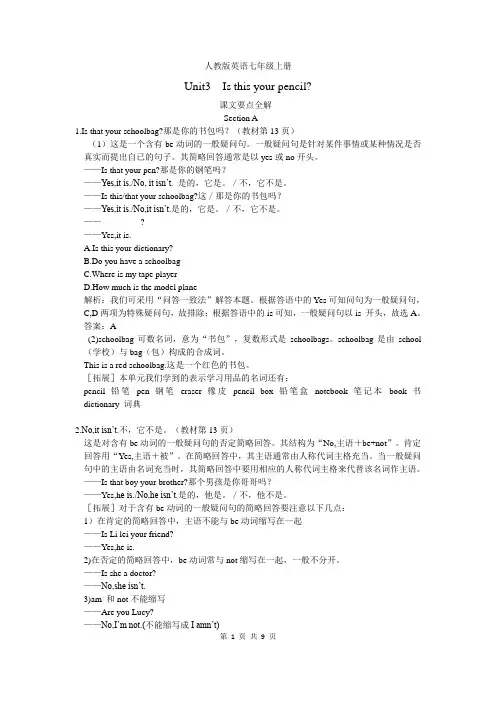
人教版英语七年级上册Unit3 Is this your pencil?课文要点全解Section A1.Is that your schoolbag?那是你的书包吗?(教材第13页)(1)这是一个含有be动词的一般疑问句。
一般疑问句是针对某件事情或某种情况是否真实而提出自已的句子。
其简略回答通常是以yes或no开头。
——Is that your pen?那是你的钢笔吗?——Yes,it is./No, it isn’t. 是的,它是。
/不,它不是。
——Is this/that your schoolbag?这/那是你的书包吗?——Yes,it is./No,it isn’t.是的,它是。
/不,它不是。
——_________?——Yes,it is.A.Is this your dictionary?B.Do you have a schoolbagC.Where is my tape playerD.How much is the model plane解析:我们可采用“问答一致法”解答本题。
根据答语中的Yes可知问句为一般疑问句,C,D两项为特殊疑问句,故排除;根据答语中的is可知,一般疑问句以is 开头,故选A。
答案:A(2)schoolbag可数名词,意为“书包”,复数形式是schoolbags。
schoolbag是由school (学校)与bag(包)构成的合成词。
This is a red schoolbag.这是一个红色的书包。
[拓展]本单元我们学到的表示学习用品的名词还有:pencil 铅笔pen 钢笔eraser 橡皮pencil box 铅笔盒notebook 笔记本book 书dictionary 词典2.No,it isn’t.不,它不是。
(教材第13页)这是对含有be动词的一般疑问句的否定简略回答。
其结构为“No,主语+be+not”。
肯定回答用“Yes,主语+被”。
在简略回答中,其主语通常由人称代词主格充当。
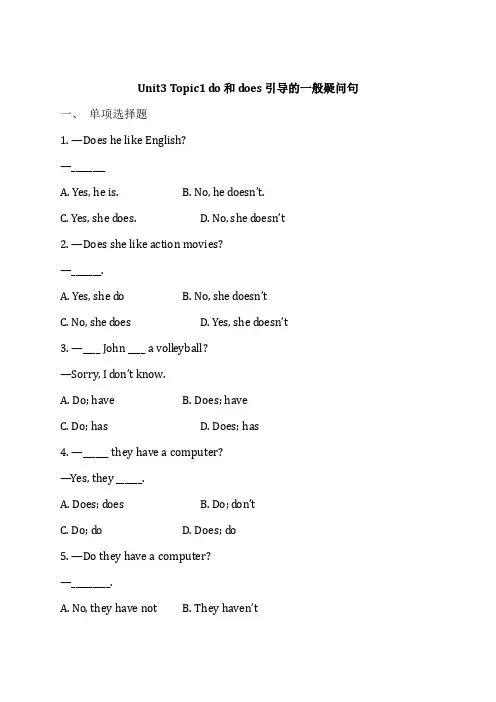
Unit3 Topic1 do和does引导的一般疑问句一、单项选择题1. —Does he like English?—________A. Yes, he is.B. No, he doesn’t.C. Yes, she does.D. No, she doesn’t2. —Does she like action movies?—_______.A. Yes, she doB. No, she doesn’tC. No, she d oesD. Yes, she doesn’t3. —____ John ____ a volleyball?—Sorry, I don’t know.A. Do; haveB. Does; haveC. Do; hasD. Does; has4. —______ they have a computer?—Yes, they ______.A. Does; doesB. Do; don’tC. Do; doD. Does; do5. —Do they have a computer?—_________.A. No, they have notB. They haven’tC. No, they doD. No, they don’t6. Do you ______ your lost keys?A. findB. foundC. lookD. look for7. —______?—Yes, he does.A. Do you like filmsB. Does her father like filmsC. Does these filmsD. Are those films8. —____ you like eggs?—Yes, I ____.A. Do; doB. Are; amC. Does; doesD. Do; am9. —Do you have uniforms?—_______, I _______.A. Yes, don’tB. No, doC. Yes, doesn’tD. No, don’t参考答案及解析1. B 本题中问句的肯定回答用Yes, he does.否定回答用No, he doesn’t.2. B 此题考查一般疑问句的回答。
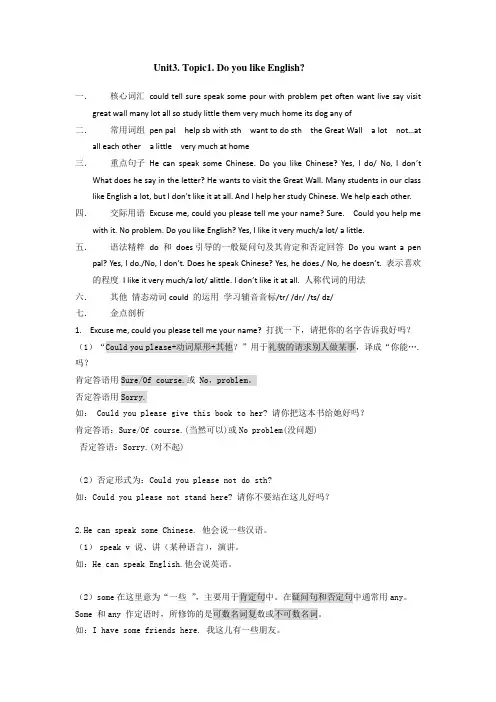
Unit3. Topic1. Do you like English?一.核心词汇could tell sure speak some pour with problem pet often want live say visit great wall many lot all so study little them very much home its dog any of二.常用词组pen pal help sb with sth want to do sth the Great Wall a lot not…at all each other a little very much at home三.重点句子He can speak some Chinese. Do you like Chinese? Yes, I do/ No, I don’t What does he say in the letter? He wants to visit the Great Wall. Many students in our class like English a lot, but I don’t like it at all. And I help her study Chinese. We help each other. 四.交际用语Excuse me, could you please tell me your name? Sure. Could you help me with it. No problem. Do you like English? Yes, I like it very much/a lot/ a little.五.语法精粹do 和does引导的一般疑问句及其肯定和否定回答Do you want a pen pal? Yes, I do./No, I don’t. Does he speak Chinese? Yes, he does./ No, he doesn’t. 表示喜欢的程度I like it very much/a lot/ alittle. I don’t like it at all. 人称代词的用法六.其他情态动词could 的运用学习辅音音标/tr/ /dr/ /ts/ dz/七.金点剖析1.Excuse me, could you please tell me your name? 打扰一下,请把你的名字告诉我好吗?(1)“Could you please+动词原形+其他?”用于礼貌的请求别人做某事,译成“你能….吗?肯定答语用Sure/Of course.或 No,problem。
Unit3 Topic1复习学案编写人:审核人:班级__________ 姓名___________ 【复习目标】1.掌握本话题新单词。
2.复习一般现在时。
3.复习所有格。
【基础知识复习导航】一、单词1. No problem 没问题2. speak Chinese 讲汉语3. Of course =Sure 当然4. help\study each other 互相帮助/学习5. live in … 居住在…6. want to do sth. 想要做某事7. in English 用英语8. help sb. with sth. 帮助某人做某事9.help each other 互相二、句型:1. Could you please +动词原形?Eg. Could you please tell me your name?2. like … very much \ a lot 非常喜欢……like … a little有点喜欢…not like … at all根本不喜欢……三、语法:(一) 一般现在时1.肯定句: We speak Chinese否定句: We don’t speak Chinese.一般疑问句: Do you speak Chinese?回答: Yes, we do. No, we don’t.2.肯定句: Mike speaks English.否定句: Mike doesn’t speak English.一般疑问句: Does Mike speak English?回答: Yes, he does. No, he doesn’t.3.动词第三人称单数构成形式(二)代词人称代词:人称单数复数主格宾格主格宾格第一人称 I me we us第二人称 you you you you第三人称 he him they themshe herit it【课堂导练】1.单项选择。
( )1.—Could you help me ____ my Chinese?—No problem.A. inB. forC. withD. about( )2.—What does he ____ in the letter?—He wants to visit my school.A. spellB. sayC. speakD. tell( )3.—____ you please tell me your name?—Sure. I’m Linda.A. DoB. AreC. CouldD. Is( )4.—Who’s the girl in red?—Sorry, I don’t know ____. I think ____ is new.A. she; sheB. her; sheC. her; herD. she; her( )5.—Where does he ____?—He ____ in Shanghai.A. live; livesB. live; liveC. lives; liveD. lives; lives ( )6.His English is very ____ and he speaks English very ____.A. good; goodB. well; wellC. well; goodD. good; well ( )7.—Do you like Chinese ____?—No. I don’t like it ____.A. a lot; at allB. a lot; a littleC. at all; a littleD. a little; a lot ( )8.— ____ is the letter from?—It’s from my friend, Wang Qiang.A. WhatB. WhereC. WhoD. Whose( )9.—____ are new here. Let’s help ____.—OK.A. They; TheyB. They; themC. Them; themD. Them; they ( )10.—You can help me with English and I can help you with Chinese.—You are right. We can help ____.A. otherB. the otherC. eachD. each other2.用所给单词的适当形式填空。
仁爱版七年级Unit3Topic1英语知识点梳理Unit 3 Topic 1英语知识点梳理Section A1. Could you please后+动词原形:意为请做…好吗?Could you please的否定是在Could you please后加not 意为请不要做…好吗?Eg: 1) Could you please _____ (help) me with my English?2) Could you please _____ (tell) me yourname?3) Could you please do me a favor? (否定句)4) Could you please come to my birthdayparty? (否定句)Could you please +动原的答语是:Sure / certainly / of course 这三个短语都意为当然Eg: 1) Could you please help me with my English? (作肯定回答)2) Could you please tell me your name?(作肯定回答)2. am / are from = come from 意为来自Eg: 1) I am from China. (同义句)= I come from China.2) They are from Canada. (同义句)= They come from Canada.3) She is from America. (同义句)= She comes from America.4) Where is he from? (同义句)= Where does he come from?5) Where are they from? (同义句)= Where do they come from?3. speak / say / tell 的区别speak 意为说后面一般跟某种语言如:speak English / Chinese/Japanese:说英语/中文/日文say 意为说后面一般跟说的具体内容如:1) Can you say the wor d “apple”in English? (apple这个单词是say说的内容2) I say I want to visit Beijing. ( I want tovisit Beijing是say说的内容)tell 意为告诉,讲诉如:1)Can you tell me your name? (你能告诉我你的名字吗) 2)I want to tell you my idea.(我想告诉你我的想法)练习:用speak / say / tell来填空1) Can you ____ English?2)I can ABC.3) Can you ____ me your name?4) My mother often ____ a story(故事)tome.5) Lily can ____ a little Chinese.6) He ____ he wants to visit Beijing.4.含有实义动词的句子变成一般疑问句的变法:首先看句子中是否有be动词,如果句子中没有be动词,就看句子中的实义动词,如果实义动词是原形,则在句首加Do;如果实义动词是加有s或es的,则在句首加Does,加了Does之后,后面的实义动词应去掉s或es,还原成原形。
do和does的区别和用法初一陈述句变一般疑问句摘要:1.do和does的基本含义和区别2.初一陈述句变一般疑问句的规则3.do和does在一般疑问句中的用法4.实例分析正文:一、do和does的基本含义和区别do和does都是助动词,它们在英语中有着广泛的用途。
do用于第一人称、第二人称和第三人称单数,而does则用于第三人称单数。
在疑问句中,它们用来询问对方的动作或状态。
此外,does还可以表示强调语气。
二、初一陈述句变一般疑问句的规则要将陈述句变为一般疑问句,我们需要遵循以下规则:1.动词变为原型:动词需用原形,即不加-s或-es。
2.助动词的选择:根据主语的人称和数,选择合适的助动词,如do、does等。
3.句首字母大写:疑问句的第一个单词需大写。
三、do和does在一般疑问句中的用法1.当主语为第一人称或第二人称时,使用do作为助动词:- I eat breakfast.(我吃早餐。
)→ Do you eat breakfast?(你吃早餐吗?)- He goes to school.(他上学。
)→ Does he go to school?(他上学吗?)2.当主语为第三人称单数时,使用does作为助动词:- She reads a book.(她看书。
)→ Does she read a book?(她看书吗?)- They watch a movie.(他们看电影。
)→ Does she watch a movie?(她看电影吗?)四、实例分析下面我们通过实例来巩固一下do和does在一般疑问句中的用法:1.原始陈述句:Tom reads a novel every day.疑问句:Does Tom read a novel every day?2.原始陈述句:Nancy and Lily go to the park on weekends.疑问句:Do Nancy and Lily go to the park on weekends?通过以上分析,我们可以看出,掌握do和does的区别及在一般疑问句中的用法,对于初一学生来说非常重要。
助动词do和does的用法
do与does都是助动词,是一些动词后面的助词,只能用于现在时态和一般疑问句。
一、do常用来作为谓语:
(1)do谓语用法只在第三人称单数形式下,即he、she、it和名词单数形式时才使用:
例如:He does his homework early in the morning.(他早上做他的作业)(2)do也用于一般疑问句中:
例如:
Do you cook dinner every night?(你每晚做饭吗?)
二、does也只用于现在时态:
(1)在第三人称单数时,要用does:
例如:Does he go to school every day?(他每天去上学吗?)
(2)does也用于一般疑问句中:
例如:Does she go to the cinema tonight?(她今晚去电影院吗?)
总而言之,do和does的用法十分简单,但却非常重要,要牢记它们的用法。
一般情况下,do用于第三人称单数形式,而does则用于现在时态以及一般疑问句,即he、she、it的一般疑问句和you的疑问句中。
另外,要特别注意的是,当动词本身用了第三人称单数形式,不用再
加上do或does,而是用动词本身。
例如:She teaches English.(她教英语)
以上就是关于do和does用法的简要介绍,大家要牢记它们的用法,切不可混淆。
Unit3 Topic1 do和does引导的一般疑问句
一、单项选择题
1. —Does he like English?
—________
A. Yes, he is.
B. No, he doesn’t.
C. Yes, she does.
D. No, she doesn’t
2. —Does she like action movies?
—_______.
A. Yes, she do
B. No, she doesn’t
C. No, she does
D. Yes, she doesn’t
3. —____ John ____ a volleyball?
—Sorry, I don’t know.
A. Do; have
B. Does; have
C. Do; has
D. Does; has
4. —______ they have a computer?
—Yes, they ______.
A. Does; does
B. Do; don’t
C. Do; do
D. Does; do
5. —Do they have a computer?
—_________.
A. No, they have not
B. They haven’t
C. No, they do
D. No, they don’t
6. Do you ______ your lost keys?
A. find
B. found
C. look
D. look for
7. —______?
—Yes, he does.
A. Do you like films
B. Does her father like films
C. Does these films
D. Are those films
8. —____ you like eggs?
—Yes, I ____.
A. Do; do
B. Are; am
C. Does; does
D. Do; am
9. —Do you have uniforms?
—_______, I _______.
A. Yes, don’t
B. No, do
C. Yes, doesn’t
D. No, don’t
参考答案及解析
1. B 本题中问句的肯定回答用Yes, he does.否定回答用No, he doesn’t.
2. B 此题考查一般疑问句的回答。
用Does提问,肯定回答为“Yes, ...does.”,否定回答为“No, ...doesn’t.”。
3. B 问句中的John为第三人称单数,所以第一空应用助动词Does;且助动词后应用动词原形,故选B。
4. C 主语是they,谓语动词是have,因此用助动词do构成一般疑问句,其肯定答语是“Yes,they do.”。
5. D 含实义动词的一般现在时的一般疑问句的回答应借助助动词。
No为否定回答,其答语中须含有not。
6. A 结合选项可知题意为“你找到丢失的钥匙了吗”,表示找的结果,且句子开头用了助动词,所以用动词原形find。
7. B 由答语“Yes, he does.”可知问句应为一般疑问句,且一般疑问句中的主语为第三人称单数,谓语为实义动词。
8. A 问句中有实义动词like,且主语是第二人称,故助动词用do,答语的助动词也用do。